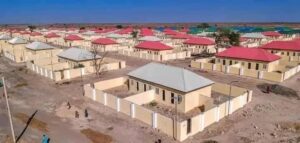NIESV, Fashola disagree over 17m housing deficit
The Nigerian Institution of Estate Surveyors and Valuers (NIESV) has faulted Minister of Works & Housing, Mr. Babatunde Raji Fashola SAN on his comments that Nigeria does not have 17 million housing deficit.
The President and chairman of the council of NIESV, ESV Sir (Chief) Emmanuel Okas Wike in a statement on Saturday said housing remains one of the basic challenges for ordinary Nigerians, especially those living in urban centres.
Fashola had dismissed the 17 million housing deficit currently brandished in Nigeria for lacking scientific proof.
He stated emphatically that Nigeria does not have 17 million housing deficit, but rapid urbanization and unaffordability have made housing inaccessible to Nigerians in the urban centres of Lagos, Abuja, Port Harcourt, Kano, Ibadan and several others.
According to him, “As a major stakeholder in the Housing sector, NIESV view the suggestion of the Honourable Minister from a different perspective.
“The Institution intends to visit him as soon as possible to deliberate and harmonize positions on the matter.
“We wish to reaffirm the importance of Data in addressing the housing provision. Data is a priority of the Institution.
“We are at the moment updating the data we earlier produced on the Nigerian Housing sector of which a copy was given to the Minister at our 49th Annual Conference of 2019 in Lagos.
“No doubt, data produced by the Institution would be reliable and acceptable to players in the real estate sector.
“The Institution shall in addition endeavour to undertake the enumeration of wasting and abandoned properties, some of which belongs to government at various levels, with recommendations on what could be done with them.”
The Minister of Works & Housing had said exorbitant amounts of rent, ranging from two to three years demanded by landlords and property owners before they let out their properties as the major cause.
He, therefore, proposed monthly rent by property owners as against the three years rent collection which has made affordable homes inaccessible for Nigerians in urban centres.
The Minister had said empty houses littered the urban centres as a result of exorbitant or outrageous rents demanded by the property owners, whereas, it is not like that in the rural areas. He wondered where income earners would get money to pay three years rent advance on a property.
Fashola urged the state governments to intervene in the management of rent, “because as long as people have to pay three years rent from salaries that earned monthly, there will be the problem of affordability, but if you reduce it to advance monthly payment people will be able to afford it, after all, there is a provision for salary advance in the private sector.”
The Honourable Minister also called for legislation on the monthly rent payment suggested.
The Institute, in addition, noted with serious concern the worsening insecurity in the country.
He said in a statementthat, “More worrisome is that the solutions to it have so far been elusive. As a leading professional organization and a major stakeholder in the Nigerian project, we are deeply worried over the continuous loss of lives and properties across the country.
“From terrorism to kidnapping, banditry and farmer-herder conflict, and mindless killing of innocent Nigerians almost on a daily basis, the situation is indeed appalling.
“A more dangerous dimension was recently introduced to the protracted issue, and that is clashes between security agencies and local insurgents in the South East, leading to the killing of several policemen and other security personnel.
“The escalation of clashes between security agencies and local insurgents call for rethink of strategies by the government on how to combat the security challenges across the country.
“We suggest the government and the security agencies should be more proactive via a well coordinated intelligence gathering.
“We implore the government to be more engaging with the aim of addressing as much as possible, the most pressing problems of hunger, unemployment and poverty in the land.
“Government should also look at the agitations of the people and endeavour to offer reassurances, build confidence and trust as much as feasible as a way of dousing tensions among the various ethnic groups.
“Religious and traditional leaders should be encouraged to preach and promote peace within their domains.
“For Nigeria to be experiencing continued attacks on helpless and peace loving citizens without bringing the perpetrators to justice, smacks of complacency by the law enforcement agencies. Government should focus on this area, and do the needful.
“We are also appealing to Nigerians to complement government efforts at restoring peace and security by playing our roles in lowering the palpable tension in the polity.
“The role of the media is crucial. I want to appeal to the media to continue to carry out its primary responsibility to inform, criticize and stimulate debate, with utmost responsibility in an atmosphere of peace and security in the overall interest of the nation.
“Farmers/Herders clashes should be addressed by the establishment of ranches, grazing reserves with modern amenities to check the moving and herding cattle on pastures.
“The Institution entertains no doubt on the ability of our security forces to tackle the security challenges we are facing now, whether it is terrorism, banditry, kidnapping or even the farmer-herder conflict.
“We appeal to all Nigerians to continue to support our security agencies, who today face the added task of having to watch their backs while working to protect us. The least we can do is to give them our unalloyed support.”




